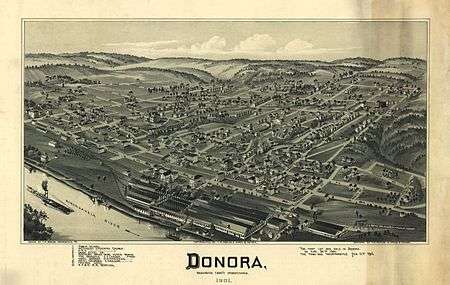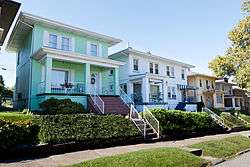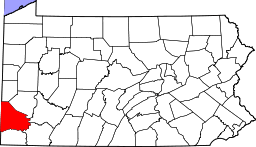Donora, Pennsylvania
| Donora | |
|---|---|
| Borough | |
|
Concrete houses in the Cement City neighborhood | |
| Etymology: portmanteau of "William Donner" and "Nora Mellon" | |
 Location of Donora in Washington County | |
 Donora Location of Donora in Pennsylvania | |
| Coordinates: 40°10′33″N 79°51′41″W / 40.17583°N 79.86139°WCoordinates: 40°10′33″N 79°51′41″W / 40.17583°N 79.86139°W | |
| Country | United States |
| State | Pennsylvania |
| County | Washington |
| Established | 1900 |
| Government | |
| • Mayor | Donald "Piglet" Pavelko |
| Area | |
| • Total | 2.0 sq mi (5 km2) |
| • Land | 1.9 sq mi (5 km2) |
| • Water | 0.2 sq mi (0.5 km2) |
| Population (2010) | |
| • Total | 4,781 |
| • Density | 2,400/sq mi (920/km2) |
| Time zone | EST (UTC-4) |
| • Summer (DST) | EDT (UTC-5) |
| ZIP code | 15033 |
| Area code(s) | 724 Exchange: 379 |
| Website | DonoraBoro.org |

Donora is a borough in Washington County, Pennsylvania, United States, approximately 20 miles (32 km) south of Pittsburgh on the Monongahela River.
Donora was incorporated in 1901. Donora got its name from a combination of William Donner and Nora Mellon, banker Andrew W. Mellon's wife. Donora's nickname is "The Home of Champions" mainly because of the large number of famous athletes who have called Donora their home. Agriculture, coal-mining, steel-making, wire-making, and other industries were conducted in Donora early in its history. In 1910, 8,174 people lived there; in 1920, 14,131; and in 1940, 13,180 people lived in Donora. According to U.S. census figures, the population was 5,653 in 2000 and 4,781 in 2010.[1] Donora is a Rust Belt place which has lost most of its industrial capacity. It is in the "Mon valley" 5 miles (8.0 km) downriver from Charleroi and 25 miles (40 km) upstream of Braddock.
Recently, Donora and other Mid-Mon Valley communities have seen an economic re-emergence as a result of the increased economic activity in the area of the newly emerging Marcellus Shale natural gas industry. Local government leaders hope that the natural gas boom will renew the prosperity that was once a trademark of the Mon Valley region.
History
In 1794, 1 mile (1.6 km) east of Donora, the Whiskey Insurrectionists held several meetings at Fells Church.
A trolley line opened in Donora on December 15, 1901, linking First and McKean and Fifteenth Street and Meldon.[2] It was extended in 1911 to Black Diamond to connect to the Charleroi to Pittsburgh interurban trolley. The line was abandoned on May 5, 1953.
The town was the scene of the infamous Donora Smog of 1948. Between October 26 and October 31, 1948, an air inversion trapped industrial effluent (air pollution) from the American Steel and Wire plant and Donora Zinc Works. "In three days, 20 people died... After the inversion lifted, another 50 died, including Lukasz Musial, the father of baseball great Stan Musial. Hundreds more finished the rest of their lives with damaged lungs and hearts. But another 40 years would pass before the whole truth about Donora's bad air made public-health history."[3] Today, the town is home to the Donora Smog Museum which tells the impact of the Donora Smog on the air quality standards enacted by the federal government in subsequent years.[4]
Donora is also listed on the National Register of Historic Places for its famous neighborhood known as "Cement City".[5] The homes built in the neighborhood are completely made out of pre-formed and poured concrete. This structural building technique was championed by Thomas Edison and there are additional neighborhoods throughout the United States that have also used this technique. The homes were built as employee housing for the Donora Wire and Steel Mill in the early 1900s."[6]
The Cement City Historic District and Webster Donora Bridge are listed on the National Register of Historic Places.[7]
Geography
Donora is located at 40°10′33″N 79°51′41″W / 40.17583°N 79.86139°W (40.175879, −79.861264).[8]
According to the United States Census Bureau, the borough has a total area of 2.0 square miles (5.2 km2), of which, 1.9 square miles (4.9 km2) of it is land and 0.2 square miles (0.5 km2) of it (7.32%) is water.
Climate
The climate in this area is characterized by hot, humid summers and generally mild to cool winters. According to the Köppen Climate Classification system, Donora has a humid subtropical climate, abbreviated "Cfa" on climate maps.[9]
| Climate data for Donora, Pennsylvania | |||||||||||||
|---|---|---|---|---|---|---|---|---|---|---|---|---|---|
| Month | Jan | Feb | Mar | Apr | May | Jun | Jul | Aug | Sep | Oct | Nov | Dec | Year |
| Average high °C (°F) | 4.6 (40.3) |
6.1 (42.9) |
11.5 (52.7) |
18.2 (64.8) |
23.8 (74.8) |
28 (82.4) |
29.9 (85.8) |
29.2 (84.5) |
25.9 (78.6) |
19.6 (67.3) |
12.5 (54.5) |
6.2 (43.1) |
17.9 (64.3) |
| Average low °C (°F) | −4.9 (23.1) |
−4.4 (24.0) |
−0.4 (31.2) |
4.6 (40.2) |
9.9 (49.8) |
15 (59.0) |
17.2 (63.0) |
16.7 (62.0) |
13 (55.4) |
6.7 (44.1) |
1.8 (35.3) |
−3 (26.6) |
6 (43) |
| Average precipitation mm (inches) | 66 (2.6) |
56 (2.2) |
86 (3.4) |
84 (3.3) |
97 (3.8) |
97 (3.8) |
94 (3.7) |
94 (3.7) |
74 (2.9) |
66 (2.6) |
69 (2.7) |
64 (2.5) |
945 (37.2) |
| Source: Weatherbase [10] | |||||||||||||
Government
Donora is a borough and consists of an elected mayor and an elected borough council.
Mayor Donald "Piglet" Pavelko was recently appointed to the position of mayor by the Donora Borough Council after the previous mayor John "Chummy" Lignelli resigned in order to better enjoy his retirement.
Mayor Emeritus John "Chummy" Lignelli proudly served the residents of Donora for nearly three decades. At age 92 when he retired, Mayor Lignelli was one of the oldest seated mayors in all of the United States.
Chief of Police: James Brice
Council President: Dennis Gutierrez
Schools
Donora is part of Ringgold School District which includes the municipalities of Donora, Monongahela, Carroll Township, Nottingham Township, New Eagle, Finleyville, and Union Township. As of 2011, Ringgold School District no longer operates any facilities within the borough that house academic classrooms for students.
Donora's youth sports mascot is the Donora Dragon and its colors are orange and black. Ever since the merge of the elementary, and middle schools, there is no longer Donora Dragon football or cheerleading.
Demographics
| Historical population | |||
|---|---|---|---|
| Census | Pop. | %± | |
| 1910 | 8,174 | — | |
| 1920 | 14,131 | 72.9% | |
| 1930 | 13,905 | −1.6% | |
| 1940 | 13,180 | −5.2% | |
| 1950 | 12,186 | −7.5% | |
| 1960 | 11,131 | −8.7% | |
| 1970 | 8,825 | −20.7% | |
| 1980 | 7,524 | −14.7% | |
| 1990 | 5,928 | −21.2% | |
| 2000 | 5,653 | −4.6% | |
| 2010 | 4,781 | −15.4% | |
| Est. 2015 | 4,663 | [11] | −2.5% |
| Sources:[12][13][14][15] | |||
As of the census[14] of 2000, there were 5,653 people, 2,469 households, and 1,434 families residing in the borough. The population density was 2,973.8 people per square mile (1,148.8/km²). There were 2,958 housing units at an average density of 1,556.1 per square mile (601.1/km²). The racial makeup of the borough was 82.10% White, 14.84% African American, 0.14% Native American, 0.27% Asian, 0.02% Pacific Islander, 0.32% from other races, and 2.32% from two or more races. Hispanic or Latino of any race were 2.02% of the population.
There were 2,469 households out of which 23.4% had children under the age of 18 living with them, 36.9% were married couples living together, 16.5% had a female householder with no husband present, and 41.9% were non-families. 37.4% of all households were made up of individuals and 21.3% had someone living alone who was 65 years of age or older. The average household size was 2.23 and the average family size was 2.95.
In the Washington County borough the population was spread out with 21.7% under the age of 18, 6.4% from 18 to 24, 25.5% from 25 to 44, 21.4% from 45 to 64, and 25.0% who were 65 years of age or older. The median age was 42 years. For every 100 females there were 82.7 males. For every 100 females age 18 and over, there were 78.4 males.
The median income for a household in the borough was $27,939, and the median income for a family was $37,176. Males had a median income of $33,725 versus $22,346 for females. The per capita income for the borough was $17,893. About 12.4% of families and 16.8% of the population were below the poverty line, including 28.2% of those under age 18 and 14.0% of those age 65 or over.
Industry
Though many group Donora in a class of Western Pennsylvania towns and cities known collectively as the "rust belt" because of the demise of the once prolific steel industry, the town continues to be a center for industry and manufacturing. On the site of the former steel mills now stands a large industrial park that is managed by MMIDA (Mid Mon Valley Industrial Development Authority). Major companies that have facilities in the Donora Industrial Park include: A-1 Babbit company, Apex N.A., Area Agency on Aging, Bergen Power Pipe Supports, BMA of Donora, HYTEC Inc., Dyno-Nobel Inc, Eastern Alloy, Eastern Hydraulic & Machine, Elizabeth Milling Corporation, Elliott Support Services, Glosser MFG, Industrial Nonferrous Casting Company, K-Z Tool Company, Airgas Specialty Products, Inc. (formerly LaRoche Industries), McGrew Welding Fabrication, Metalife Resources, MIDA Inc., Mon Valley Child Care, Mon Valley Sewage Authority, Monessen Ambulance Service, Nitrous Oxide Corporation, Power & Industrial Services Corporation, Nichols Miniatures, Pittsburgh Post Gazette Distribution Center, RAS Industries Inc., Regal Industries Inc.and Spartech Polycom.[16]
Cement City
Donora is home to the world's 2nd largest "Cement City" housing tract, innovated by Thomas Edison. The neighborhood consists of 80 "poured in place" homes.[17]
Notable people
- Stan Musial of the St. Louis Cardinals and Baseball Hall of Famer
- Ken Griffey, Jr. Baseball (both Griffey and Musial were born on November 21) and Baseball Hall of Famer
- Ken Griffey, Sr. Baseball. Ken Griffey Sr.'s father was Joseph "Buddy" Griffey, a local athlete who was a teammate of Musial on the Donora High School baseball team.
- Arnold Galiffa All-American and professional football player.
- Reggie Walton, United States District Judge for the District of Columbia appointed in 2001, after being nominated to the position by President George W. Bush.
- Devra Davis and Mary Amdur Scientists, investigated the 1948 Donora smog.[18]
Further reading
- Davis, Devra (2002). When Smoke Ran Like Water: Tales of Environmental Deception and the Battle Against Pollution. Basic Books. ISBN 978-0-465-01521-4.
- Roueché, Berton (1954). Eleven Blue Men and Other Narratives of Medical Detection. Little, Brown.
- Snyder, Lynn Page (1994). "The Death-Dealing Smog over Donora, Pennsylvania: Industrial Air Pollution, Public Health, and Federal Policy, 1915–1963". University of Pennsylvania.
- Bryson, Chris (Fall 1998). "A Secret History of America's Worst Air Pollution Disaster". Earth Island Journal. 13.
- Stacey, Charles (2010). Donora. Arcadia Publishing. ISBN 978-0-7385-7206-2.
- University of Pittsburgh Archives Service Center, Bruce Drisbach-American Steel & Wire Company Photograph Collection (Donora, Pennsylvania, 1915-1917)
References
- ↑ http://factfinder.census.gov/faces/nav/jsf/pages/community_facts.xhtml?src=bkmk
- ↑ Paglia, Ron (June 25, 2006). "Riding down memory lane". Pittsburgh Tribune-Review. Retrieved October 15, 2009.
- ↑ The Globe and Mail, December 7, 2002, book review by Andrew Nikiforuk When Smoke Ran Like Water by Devra Davis
- ↑ "Smog Deaths In 1948 Led To Clean Air Laws". Retrieved 2011-08-17.
- ↑
- ↑
- ↑ National Park Service (2010-07-09). "National Register Information System". National Register of Historic Places. National Park Service.
- ↑ "US Gazetteer files: 2010, 2000, and 1990". United States Census Bureau. 2011-02-12. Retrieved 2011-04-23.
- ↑ Climate Summary for Donora, Pennsylvania
- ↑ "Weatherbase.com". Weatherbase. 2013. Retrieved on October 24, 2013.
- ↑ "Annual Estimates of the Resident Population for Incorporated Places: April 1, 2010 to July 1, 2015". Retrieved July 2, 2016.
- ↑ "Number of Inhabitants: Pennsylvania" (PDF). 18th Census of the United States. U.S. Census Bureau. Retrieved 22 November 2013.
- ↑ "Pennsylvania: Population and Housing Unit Counts" (PDF). U.S. Census Bureau. Retrieved 22 November 2013.
- 1 2 "American FactFinder". United States Census Bureau. Retrieved 2008-01-31.
- ↑ "Annual Estimates of the Resident Population". U.S. Census Bureau. Retrieved 22 November 2013.
- ↑ http://www.mmida.com/donora.html
- ↑ http://www.post-gazette.com/local/south/2014/10/09/Cement-City-Donora-open-for-tour-Mon-Valley/stories/201410090037
- ↑ Musil, Robert, K. (2014). "2. Don't Harm the People: Ellen Swallow Richards, Dr. Alice Hamilton, and their heirs take on polluting industries". Rachel Carson and Her Sisters: Extraordinary Women Who Have Shaped America's Environment. Rutgers University Press. ISBN 9780813571768. Retrieved 4 January 2016.

